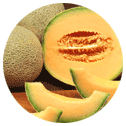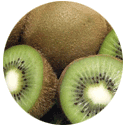Watermelon Health Benefits And Nutrition Values
In recent research new light is found on its potential health benefits.Watermelon contains more lycopene, an antioxidant that may help to reduce the risks of cancer and other diseases. This fruit can be traced back to Africa and it is part of the cucumber and squash family. Early watermelons were mostly rind and seeds. Today's varieties are larger, the flesh is sweeter, the seeds are smaller and the rind is thinner. It is the most refreshing, thirst satisfying fruit of all. It consists of 92% water and 8% sugar, so it is appropriately named. Americans consume over 17 lbs of watermelon each year. The largest watermelon on world record (Guinness Book of World Records) weights 262 pounds. Watermelons are mostly available throughout year. It is a perfect fruit to a salad, salsa, or cool drink.

Nutrient |
Amounts/Selected Serving |
DV% |
|---|---|---|
Calcium |
10.8mg |
1% |
Iron |
0.4mg |
2% |
Magnesium |
15.4mg |
4% |
Phosphorus |
16.9mg |
2% |
Potassium |
173mg |
5% |
Sodium |
1.5mg |
~ |
Zinc |
0.2mg |
1% |
Copper |
0.1mg |
3% |
Manganese |
0.1mg |
3% |
Selenium |
0.6mcg |
1% |
Fluoride |
2.3mcg |
~ |
Nutrient |
Amounts/Selected Serving |
DV% |
|---|---|---|
Calories |
46.2(193 kJ) |
2% |
Carbohydrate |
41.1(172 kJ) |
~ |
Fat |
1.9(8.0 kJ) |
~ |
Protein |
3.2(13.4 kJ) |
~ |
Alcohol |
0.0(0.0 kJ) |
~ |
Nutrients |
Amounts/Selected Serving |
DV% |
|---|---|---|
Cholesterol |
0.0mg |
0% |
Phytosterols |
3.1mg |
~ |
Nutrient |
Amounts/Selected Serving |
DV% |
|---|---|---|
Total Fat |
0.2g |
~ |
Saturated Fat |
0.3g |
~ |
Monounsaturated Fat |
0.1g |
~ |
Polyunsaturated Fat |
0.1g |
~ |
Total trans fatty acids |
~ |
~ |
Total trans-monoenoic fatty acids |
~ |
~ |
Total trans-polyenoic fatty acids |
~ |
~ |
Total Omega-3 fatty acids |
~ |
|
Total Omega-6 fatty acids |
77mg |
~ |
Nutrient |
Amounts/Selected Serving |
DV% |
|---|---|---|
Vitamin A |
876IU |
18% |
Vitamin C |
12.5mg |
21% |
Vitamin D |
~ |
~ |
Vitamin E(AlphaTocopherol) |
0.1mg |
~ |
Vitamin K |
0.2mcg |
|
Thiamin |
0.1mg |
3% |
Riboflavin |
~ |
2% |
Niacin |
0.3mg |
1% |
Vitamin B6 |
60.1mg |
3% |
Folate |
||
Vitamin B12 |
120mcg |
|
Pantothenic Acid |
0.3mg |
3% |
Choline |
6.3mg |
~ |
Betaine |
0.5mg |
~ |
Nutrient |
Amounts/Selected Serving |
DV% |
|---|---|---|
Total Carbohydrate |
11.6g |
4% |
Dietary Fiber |
0.6g |
2% |
Starch |
~ |
|
Sugars |
9.5g |
~ |
Nutrient |
Amounts/Selected Serving |
DV% |
|---|---|---|
Protein |
0.9g |
2% |
Nutrient |
Amounts/Selected Serving |
DV% |
|---|---|---|
Alcohol |
0.0g |
0.0% |
Water |
141g |
~ |
Ash |
0.4g |
~ |
Caffeine |
0.0g |
0.0% |
Theobromine |
0.0g |
0.0% |
- Kidney Disorder & High Blood Pressure
- Heat Stroke
- Diabetes
- Heart Care
- Water
- Weight Loss
- Cancer
- Macular Degeneration
As it is high in water content, it provides frequent urinating, which is helpful for washing off kidneys. It also helps in reducing concentration of uric acid in the blood, thereby reducing the kidney damages and formation of renal calculi in the body. These fruits are very much useful in cleaning out the toxic depositions present in the kidneys. As it contains high amount of Potassium and magnesium are good in bringing down the blood pressure. The carotenoids present in them prevent hardening of walls of arteries and veins, hence helps to reduce the blood pressure in the human body. Water Melon contains high amount of potassium which are good for bringing down the kidney disorder.
Due to intake of Water melon highly helps in reducing off body temperature and blood pressure for the humans. Large amount of peoples from various regions consumes fruit daily in time of noon during summer’s seasons to protect them from heat stroke. Watermelon is the best fruit when comparing to others helps to reduce the heatstroke for the human body. This is rich in water content which also helps the body to maintain frequent urinating during summer season.
Diabetes patients, are supposed to have lower energy and low sugar diet. Water Melons can be a good supplement for them. a thick wedge of this fruit will give you very few calories, since ninety nine percent of its total weight is composed of water and roughage. Moreover, the various vitamins and minerals such as potassium and magnesium present in this fruit help in proper functioning of insulin in the body, thus lowering the blood sugar level. Arginine, and another component found in water melons, is very much effective in enhancing impact of insulin on sugar.
The watermelon is more essential for heart diseases. The roughage in water melon is very low energy, from vitamin-C, Carotenoids and potassium, help to reduce the cholesterol and keep your heart safe. The watermelon is full of antioxidants. These are elements that prevent the production of free radicals in the body. Antioxidants also ensure that overproduction of substances in the body is prevented. Beta carotene, the remarkable anti oxidant and anti aging properties, also keeps you young and helps to prevents age related cardiac problems from the heart.
Your body needs water for cells processes and for smooth skin. When you bite a watermelon, you mouth gets filled with a liquid. This is actually the watermelon juice contain 90% water. The watermelon has a large amount of water because it is rich in electrolytes. The body temperature increases when the weather gets hot. The watermelon will actually help you cool off because of the water contents it holds.
The water melon is the perfect solution when you want to eat something so delicious and tasty run no risk of gaining weight. This fruit will enable you lose weight automatically. This is mainly because it is fat free.
Watermelon is a concentrated source of the carotenoid, lycopene. Lycopene is present in high amounts in watermelon. The reason is that why the watermelon is red in color inside because most red fruits and vegetables have a high level of lycopene but the watermelon has the highest amount of lycopene. Lypocene, a carotenoid found in rich amount in water melon, improves the cardiac functions of the heart. People who include watermelons in their diet have a lesser chance of getting a heart attack.
Lycopene has been extensively for its antioxidant and cancer-preventing properties. Lycopene has been repeatedly found to be protective against a growing of cancers. These cancers now include prostate cancer, breast cancer, endometrial cancer, lung cancer and colorectal cancers.
The antioxidant function of lycopene-its ability to help protect cells and other structures in the body from oxygen damage-has been linked in human research to prevention of heart disease. Protection of DNA (our genetic material) inside of white blood cells has also been shown to be an antioxidant role of lycopene.
Eating watermelon can protect the effects of macular degeneration. Macular degeneration is just for loss of vision. Watermelon can able to fight against the age-related problems of vision loss. Eating watermelon is actually healthy for your eyes than eating carrots.
PERSON WHOM MAY NOT CONSUME WATERMELON:
- Hyperkalemia
- Hydration of Body
- Blood Vessel Relaxation
- Gastrointestinal
Eating a large amount of watermelon is not good for health that might lead to hyperkalemia. This results when potassium levels in your blood gets too high. Hyperkalemia is found when kidney disease is already present in the human body. Watermelon contains a high level of potassium. The symptoms of hyperkalemia include fainting, an irregular heart rhythm, stomach upset and vomiting and exhaustion. Hence by consuming watermelon the above symptoms can be resulted.
Watermelon was rich in water content. Due to intake of this will affect the body well to be hydrated. Eating too much watermelon, however, could result in the need to urinate frequently.
Watermelon contains phytonutrients including citrulline. This nutrient turns into arginine in the body, which increases the level of nitric oxide and relaxes blood vessels in the body. Watermelon provides the same blood vessel relaxation in the body that is found with the drug Viagra. Thus for men, an effect of eating watermelon is it possibly prevents or helps treat erectile dysfunction.
Consuming large amounts of lycopene-rich foods, such as tomatoes and watermelon, may result in gastrointestinal disturbances. The effects of a lycopene-rich supplement on a patient. The patient took a tomato supplement containing 15 mg of lycopene twice daily and experienced intestinal problems such as nausea, vomiting, diarrhea, indigestion and bloating.















